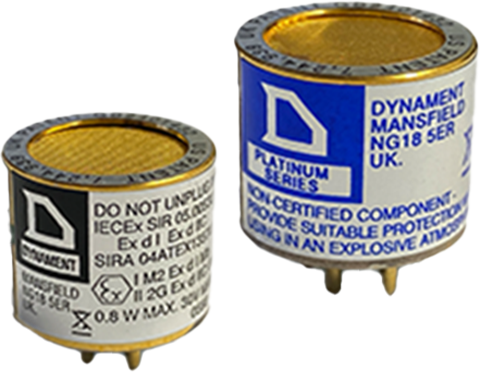
Gas Detection Solutions for HVAC Applications
Reliable Gas Detection for HVAC Safety & Performance
Heating, ventilation, and air conditioning (HVAC) systems must be safe, efficient, and compliant.
At Dynament, our infrared (NDIR) gas sensors provide accurate detection of refrigerants, hydrocarbons, and carbon dioxide (CO₂), enabling improved safety, reduced energy waste, and enhanced regulatory compliance.
Why Gas Detection Matters in HVAC
In HVAC environments, gas leaks can:
-
Impact comfort and indoor air quality
-
Reduce system efficiency
-
Create fire or health hazards
-
Lead to regulatory non-compliance
Our sensors help detect issues early so systems stay safe and efficient.
Key HVAC Applications
Refrigerant Leak Detection
Refrigerants (e.g., R-32, R-454, R-290) may be flammable or harmful if they leak. Early detection:
-
Prevents energy loss
-
Reduces greenhouse gas emissions
-
Supports compliance with F-gas regulations
Recommended Refrigerant Sensors
Refrigerant Infrared Gas Sensors – Platinum Series
Accurate, temperature-compensated detection of standard refrigerants. Ideal for leak monitoring in AC and chiller systems.
Infrared Gas Detector – Axiom Series
Certified to UL60335-2-40 Annex LL, with high-resolution detection, long lifespan, and no calibration required. Designed for demanding refrigerant monitoring in HVAC and chiller applications.
Hydrocarbon Gas Detection for HVAC Applications
Hydrocarbons can accumulate in air handling units, plant rooms, and mechanical spaces. Our NDIR hydrocarbon sensors provide reliable detection of gases such as methane and propane, helping prevent safety risks and improving HVAC system control.
Benefits of hydrocarbon monitoring in HVAC:
-
Early detection of methane and propane leaks
-
Supports automatic alarms and ventilation control
-
Helps protect occupants, equipment, and critical assets
Recommended Hydrocarbon Sensors
Hydrocarbon Infrared Gas Sensors – Platinum Series
High-accuracy methane and propane detection, with linearised outputs and low-power options for integration with building systems.
CO₂ Air Quality Monitoring
High CO₂ levels reduce comfort and cognitive performance. Continuous CO₂ monitoring:
-
Improves ventilation control
-
Enhances indoor air quality
-
Reduces energy use by ventilating only when needed
Recommended CO₂ Monitoring Sensors
Carbon Dioxide Infrared Gas Sensors – Platinum Series
Wide measurement ranges from 500 ppm to 100% CO₂, dual-gas capability, and stable output for accurate air quality control.
Smart HVAC Integration
Our gas sensors support modern HVAC control systems by:
-
Feeding real-time data to building management systems
-
Enabling demand-controlled ventilation
-
Optimising energy recovery ventilators for efficiency
Recommended Products
Refrigerant Infrared Platinum Sensors | Dynament
High-resolution, temperature-compensated sensing for refrigerants. Supports smart HVAC control by enabling accurate, real-time monitoring for energy-efficient ventilation and system optimisation.
Recommended Products
Hydrocarbon Infrared Gas Sensors – Platinum Series
Carbon Dioxide Infrared Gas Sensors – Platinum Series
Refrigerant Infrared Gas Sensors – Platinum Series
Flexible sensor options for CO₂, refrigerants, and hydrocarbons.
The Axiom Series
The Axiom Series is engineered for precision refrigerant gas detection using non-dispersive infrared (NDIR) technology. It is compatible with a wide range of refrigerants including R-32, R-454 blends, R-290 and R-744. High selectivity and sensitivity.
Long operating life with minimal maintenance
Compact design for easy integration
Available with analogue and digital outputs
Application Benefits:
- Early detection of refrigerant leaks to prevent energy losses and equipment damage
- Supports compliance with F-gas regulations and environmental standards
- Certified to UL 60035-2-40 Annex L
Learn more about the Axiom Series

Hydrocarbon Gas Detection for Safety and Control
Our Platinum Series infrared sensors are designed to detect a broad range of flammable hydrocarbon gases such as methane, propane, and butane, common in HVAC environments.
Factory-calibrated for easy integration
Durable, compact, and low maintenance
Excellent long-term stability and repeatability
Application Benefits:
- Enables safe operation in areas with hydrocarbon presence
- Ideal for IAQ systems and gas ventilation monitoring
- Hazardous area certification available
Learn more about Hydrocarbon Platinum Sensors

Simultaneous Hydrocarbon and CO₂ Detection
The Low Power Dual Gas sensor combines hydrocarbon and carbon dioxide detection into a single compact module, perfect for smart HVAC systems and confined space monitoring.
- Digital communication interface for intelligent systems
- Low power consumption with high performance
- Reduces component count and system complexity
- Optimizes ventilation based on real-time gas concentration data
- Hazardous area certification available
Learn more about the Low Power Dual Gas Sensor

Why Choose Dynament Infrared Sensors for HVAC?
- Trusted NDIR technology with global field-proven reliability
- Designed for demanding HVAC environments
- Flexible integration options for new and retrofit systems
- Comprehensive technical support and expertise
- Whether you’re building next-generation HVAC systems or upgrading existing infrastructure, Dynament provides the sensing technology you can depend on.
Contact Us
Need help selecting the right sensor or integrating our products into your HVAC system?
We’re here to support your application from concept to deployment.
